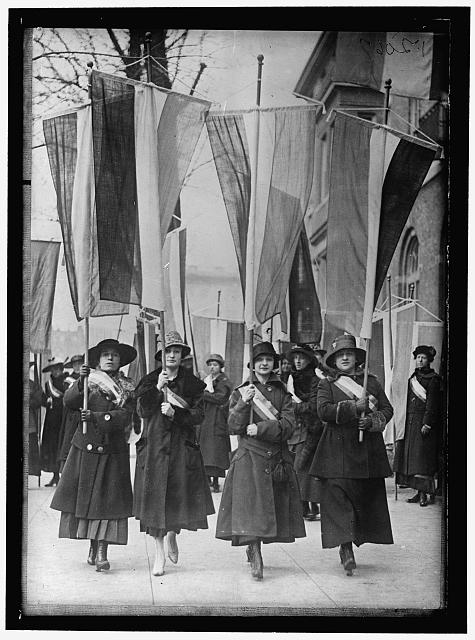
by Jill Finkelstein
Link Roundup: Women's Equality Day
Welcome to this week’s installment of Lilith’s Link Roundup. Each week we post Jewish and feminist highlights from around the web. If there’s anything you want to be sure we know about, email us or leave a message in the comments section below.
The cover story from Lilith’s summer 2011 “Swimsuit Issue” was featured in Tablet Magazine and the New York Times opinion section in a letter from Deborah Lipstadt. [NY Times] & [Tablet Magazine]
 In honor of Women’s Equality Day on August 26th, a coalition of women’s groups have launched #HERvotes, a new campaign to “mobilize women voters in 2012 around preserving women’s Health and Economic Rights (HER rights).” The campaign kicked off by releasing a list of the Top Ten Historic Advances for Women Now at Risk. [Ms. Magazine]
In honor of Women’s Equality Day on August 26th, a coalition of women’s groups have launched #HERvotes, a new campaign to “mobilize women voters in 2012 around preserving women’s Health and Economic Rights (HER rights).” The campaign kicked off by releasing a list of the Top Ten Historic Advances for Women Now at Risk. [Ms. Magazine]
On August 18th, in honor of the 91st anniversary of the passage of the 19th amendment to the U.S. Constitution, JWA recognized the Jewish leaders of the women’s suffrage movement. [Jewesses With Attitude]
Writer Eryn Loeb explained why Gloria Steinem and so many other second-wave feminists were Jewish. [Tablet Magazine]
A new study from Georgetown University’s Center on Education and the Workforce revealed that women have to earn a Ph.D. in order to obtain the same lifetime earnings as men with a Bachelor’s Degree. [Feministing]
Shana Strauch Schick became the first woman to receive a doctorate in Talmud from Yeshiva University. Schick also holds both a bachelor’s and a master’s degree from Stern College for Women, however Stern does not currently have a doctoral program. [YU News]
Last week, TIME magazine featured a profile on Areleh Harel, the West Bank Orthodox rabbi who serves as a matchmaker between gay men and lesbians. Harlel began matchmaking to allow Orthodox homosexual Jews to fulfill their desires to start families and remain in the religious community, while also keeping their sexual orientation a secret. Rabbi Andrea Myers criticized the process, stating, “The key problem with these matches is coercion, people feeling forced into marriage because they see no viable alternative.” [Huffington Post]
In her new book, Loved and Hated: Women in the Bible, Midrash and Modern Hebrew Literature, Professor Aliza Shenhar shines a light on the “chauvinistic treatment of women in the Bible.” [Haaretz]
In light of the recent circumcision ban measure in San Francisco, feminist mohel Emily Blake shared what it means to perform a bris from a woman’s perspective. [The Sisterhood]
New York Times Magazine featured an article about the morality selective reduction in the case of twins. One woman, who became pregnant with twins as a result of IVF, explained her decision to use selective reduction, saying “we created this child in such an artificial manner — in a test tube, choosing an egg donor, having the embryo placed in me — and somehow, making a decision about how many to carry seemed to be just another choice.” [New York Times]
During a screening of Dirty Dancing to benefit the New York Abortion Access Fund, the film’s screenwriter and producer Eleanor Bergstein shared why she insisted on depicting an illegal abortion in the film and why abortion is rarely portrayed realistically in the entertainment industry. [Jezebel]
A New Jersey bridal shop was slammed with a flood of negative reviews on Yelp after the owner refused to sell a wedding dress to a lesbian. The bride Alix Genter told the Philadelphia Daily News, “She also said that I came from a nice Jewish family, and that it was a shame I was gay.” [Philadelphia Daily News]
Kaya Stern-Kaufman followed in the footsteps of Sara Hurwitz by becoming the second woman to adopt the title of “rabba.” [JWeekly]
Have Jewish women become sex symbols? Writer Danielle Berrin shares how the newest generation of Jewish actresses gives Jewish women an image boost by overturning old stereotypes. She argues “their experience as openly Jewish in Hollywood speaks to an evolving acceptance of Jewishness in an industry that, from its inception, was peopled by Jews who changed their names, if not their visages, to hide their heritage.” [Jewish Journal]
Author Anna Solomon uncovered the little-known history of Jewish mail-order brides and revealed how these women became the inspiration behind her forthcoming novel, The Little Bride. [Tablet Magazine]
Despite the High Court’s ban on sex segregation in Israel, a Haredi woman was recently rejected when trying to purchase a ticket for Jerusalem’s light rail. The woman stated that upon requesting the ticket, the salesman told her that his stand did not serve women and that she would need to go to a different stand two blocks away in order to receive service. [Ynet]
Israel’s Attorney General Yehuda Weinstein overturned a clause that would have prevented women from becoming chairman of Or Yehuda Academic Center’s student union. The ultra-Orthodox, male-dominated campus had previously approved the measure that reserved the position of union chairman “to the gender to which the majority of potential voters belong.” [Jerusalem Post]
Researchers from Tel Aviv University have developed a sensor that can successfully detect the presence of date rape drugs. [Ynet]